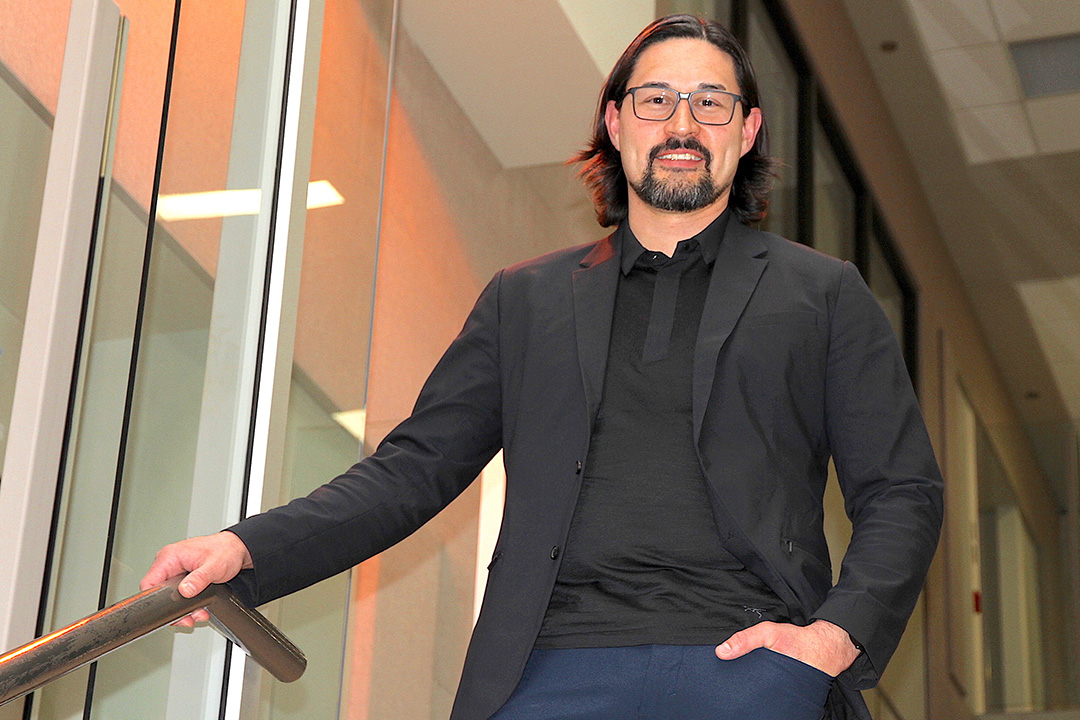
Inspiring Indigenous STEM students at USask
Matt Dunn (BE'04, MSc'10) wasn’t always comfortable with the idea of being a role model.
By James ShewagaBut having experienced first-hand some of the challenges Indigenous students face when it comes to studying in science, technology, engineering and math (STEM) fields, he is passionate about having the opportunity to help open the door to opportunities at the University of Saskatchewan (USask).
“Growing up I always enjoyed the sciences and I had a goal at one time of becoming an astronaut, so I’ve always been a proud nerd and math and sciences and the STEM fields have always resonated with me,” said Dunn (BE'04, MSc'10), the Indigenization and reconciliation co-ordinator in USask’s Office of the Vice-Provost Indigenous Engagement. “Having been an undergrad student and a master’s student, I was able to experience first-hand what some of the barriers for Indigenous students are in the field. So, it has been great to go on to become a staff member in positions where I can work with others to address those barriers.”
One of the founding members of the Saskatchewan professional chapter of the Canadian Indigenous Science and Engineering Society (.caISES), Dunn is helping bring the annual national conference—the 2020 .caISES Gathering—to campus from Feb. 28 to March 1. Close to 150 individuals from across the country are expected to take part in the annual gathering, in support of Indigenous STEM students.
“With these .caISES national gatherings, we are trying to facilitate more Indigenous STEM students, professionals and allies and bring them together so that they can see they are not alone, and they can see what the opportunities are,” he said. “It’s a great opportunity for the University of Saskatchewan to showcase the students, staff and faculty that we have on campus who are doing great work in this area.”
The .caISES Gathering begins on the same day as USask’s 3rd Annual Building Reconciliation Internal Forum— māmowi āsohtētān (Let’s Cross This Together)—and three weeks after Indigenous Achievement Week, a trio of events supporting Indigenization efforts underway across campus as part of University Plan 2025 to be The University the World Needs.
“The change on campus has been very noticeable,” said Dunn, who completed his bachelor’s and master’s in mechanical engineering at USask and earned the prestigious Indspire Award in 2003. “When I did my engineering undergraduate degree, that was 1999 to 2004, I felt like one of the only Indigenous students in the college.
“And coming back to campus in 2014, when I started working for the college, there was a noticeable difference. You could see more Indigenous employees in more prominent positions, and the community of students and staff was more prevalent and it was a nice change.”
Dunn, who is Dene and a member of the Athabasca Chipewyan First Nation, split his time growing up in both urban (Edmonton) and rural (Watrous) settings, before coming to USask to study and compete for the Huskie Athletics track and field team.
“Being a Huskies student-athlete was great for me,” said Dunn, who went on to coach Team Saskatchewan in the 2014 North American Indigenous Games and now helps coach the Running Wild track club. “Huskie Athletics was where I met many of my life-long friends. It was where I met my now wife, Adrianne Vangool, who is a much better pole vaulter than me! We met pole vaulting together.
“Those relationships that I developed as a Huskie athlete, surrounded by my peers and role models, were really beneficial. You have to balance being a student and an athlete and those skills helped me get my degree and I have been able to utilize them in my career as well.”
After working six years in the field and earning his professional engineer designation, Dunn returned to USask to help the next generation of Indigenous engineers before moving into his new role to support Indigenization and reconciliation initiatives across campus.
“It’s nice having the opportunity for broader reach across campus,” said Dunn. “And if students can see some of the things that I’ve been fortunate to be able to do and if they can see themselves doing similar things, that’s great.”
Article originally published on https://news.usask.ca/.

